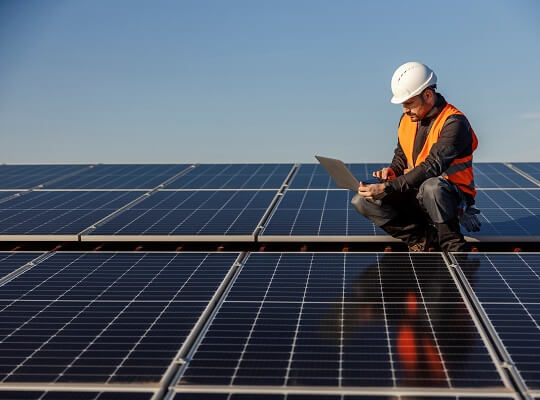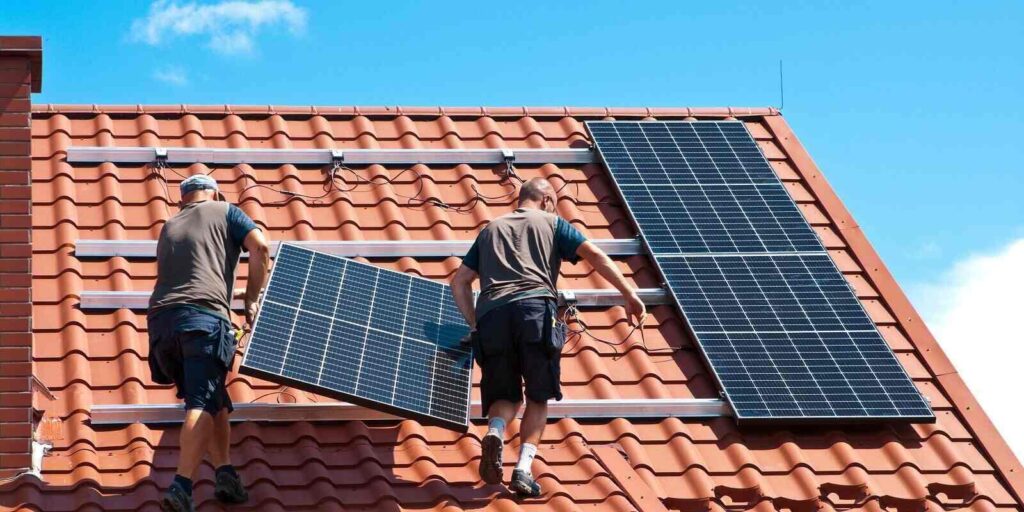Choosing the Best Solar Energy Company in Fort Lauderdale: Leading Providers and Their Products
Choosing the Best Solar Energy Company in Fort Lauderdale: Leading Providers and Their Products
Blog Article
Just How to Pick the Right Solar Energy Installation for Your Energy Needs
Selecting a suitable solar power installation needs a methodical approach that begins with a clear understanding of your power consumption patterns and awaited future demands. Variables such as the type of solar modern technology, setup expenses, and offered incentives play crucial functions in making an educated decision.
Assess Your Energy Demands
Evaluating your power requires is a critical very first action in the solar power installation process. Recognizing your present and future power intake will certainly guide the layout of an efficient solar system customized to your needs.
Take into consideration seasonal variations in energy consumption, as specific months may require even more power because of home heating or air conditioning needs. In addition, examine any planned changes in way of life or home, such as the purchase of electric vehicles or home expansions, which might increase your power needs in the future.
When you have a detailed understanding of your power intake, you can establish the ideal solar ability required to satisfy those requirements. This analysis not just assists in sizing the solar installation however likewise notifies decisions about power storage solutions and potential grid link demands. solar photovoltaic. Ultimately, accurately assessing your energy needs makes certain that your solar energy system operates effectively, delivering the advantages of renewable resource abreast with your usage patterns

Evaluate Solar Technology Options
When thinking about a solar power setup, it is necessary to assess the various solar modern technology alternatives offered to make certain the system lines up with your power requirements and spending plan. The primary technologies consist of monocrystalline, polycrystalline, and thin-film photovoltaic panels, each offering unique advantages and downsides.
Monocrystalline panels are recognized for their high efficiency and efficiency in restricted area, making them suitable for residential setups with less roofing system area. Nevertheless, they tend to be much more pricey. Polycrystalline panels, while a little less efficient, are normally more affordable and can be an excellent option for larger installations where space is not a restraint. Thin-film solar panels are light-weight and adaptable, suitable for unique surfaces, however they generally have reduced performance and call for more area to produce the same energy result.
Along with panel types, think about solar inverters, which convert the straight current generated by the panels into alternating existing for home usage. String inverters, microinverters, and power optimizers each have distinct benefits that can affect system efficiency. Evaluating these options will assist you make an educated decision that meets your energy requirements efficiently.
Think About Installation Prices
Recognizing installation costs is essential for anyone considering a solar power system. These prices can differ dramatically based upon a number of variables, consisting of system dimension, kind of panels, and installment complexity. A common domestic solar installation may vary from $15,000 to $30,000 prior to motivations, which can be a substantial upfront investment.
To properly assess setup expenses, it is vital to obtain detailed quotes from numerous solar service providers. These quotes should break down the prices of tools, labor, permits, and any type of additional devices required for the installation. Pay close focus to the top quality of products being offered, as higher-quality panels and inverters can lead to far better performance and long Visit Your URL life, possibly balancing out greater preliminary costs.
In addition, think about the long-term implications of installment costs. A cheaper setup might conserve money in advance but can result in higher upkeep costs or minimized power production with time. It is likewise suggested to assess financing options, such as solar loans or leases, which can influence your overall economic dedication.
Research Local Incentives
Discovering local rewards can significantly affect the general expense of a solar energy installation. Many areas use a range of monetary rewards focused on advertising sustainable power use, making solar energy much more available and economical for homeowners and services alike.
These motivations may consist of government tax debts, state rebates, and neighborhood utility firm programs that offer cash money motivations or web metering options. As an example, the Federal Investment Tax Obligation Credit (ITC) permits you to subtract a considerable percent of your solar setup prices from your federal tax obligations. State-specific motivations can further boost these savings, usually in the form of straight cash money rebates or tax credits.
Furthermore, some neighborhood federal governments might provide real estate tax exemptions for solar installments, making certain that your financial investment does not boost your real estate tax responsibility. Looking into these motivations can reveal substantial cost savings, which can influence your choice on the dimension and kind of solar system to install.

Pick a Respectable Installer
Picking a reliable installer is important to making sure the success and long life of your solar energy system. The installation process considerably affects the performance and go to this web-site effectiveness of your photovoltaic panels, making it important to select a specialist with a tested performance history. Begin by investigating regional installers through on the internet testimonials and reviews. Sites such as the Bbb can give understanding right into client contentment and service dependability.
Next, verify the installer's qualifications, including licenses, accreditations, and insurance. A reputable installer ought to hold qualifications from identified organizations, such as the North American Board of Certified Power Professionals (NABCEP), suggesting a high level of knowledge. In addition, ask about the installer's experience with comparable projects, especially in your location, as regional environment and policies can influence installment practices.
Demand multiple quotes and compare them not just on rate yet likewise on the top quality of equipment his response and guarantees offered. A credible installer must supply clear information regarding their items and services, aiding you make an educated decision. By investing time in picking a trusted installer, you will certainly boost the total performance and resilience of your solar energy system.
Verdict
To conclude, selecting the proper solar energy installation requires a detailed evaluation of energy requirements, an understanding of offered solar modern technologies, and a mindful factor to consider of installation costs. Examining local rewards can enhance economic advantages, while picking a reliable installer guarantees quality workmanship and reliability. solar photovoltaic. By systematically examining these aspects, individuals can accomplish an optimal solar service that satisfies both existing and future power needs, eventually contributing to sustainable power methods and price financial savings gradually
Report this page